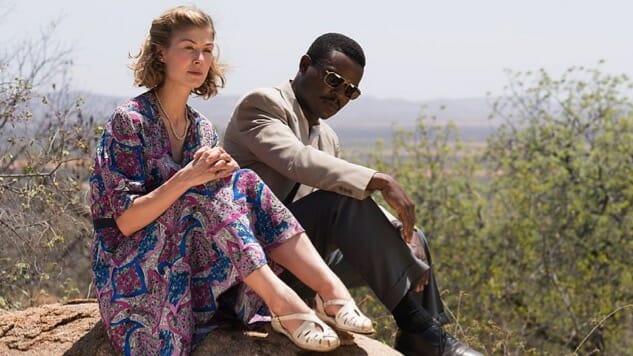
A United Kingdom—Amma Asante’s docudrama about the controversy that resulted both at home and abroad when Seretse Khama, prince of the African nation formerly known as Bechuanaland (now Botswana), brought home a British white woman, Ruth Williams, as his bride—gets off on the wrong foot early. The first half-hour, which chronicles Seretse’s (David Oyelowo) and Ruth’s (Rosamund Pike) courtship, while the former is still an exchange student in London, feel oddly truncated, with Asante and screenwriter Guy Hibbert relegating the characters’ supposedly grand romance to a few brief, clipped scenes. In terms of screen time, it’s maybe a mere 15 minutes between when they first meet at a social gathering to which Ruth’s sister, Muriel (Laura Carmichael), brings her along, and when Seretse is proposing marriage to her on a bridge along the Thames. Along the way, we barely see enough of their interactions together to grasp what they see in each other, or even get a sense of what makes them tick individually.
Perhaps the filmmakers were merely rushing the romantic stuff to get to the sociopolitical commentary that interested them more. A United Kingdom becomes much more engaging when Seretse finally brings Ruth back to his home country—when the initial tension between he and his disapproving uncle, Tshekedi (Vusi Kunene), eventually blossoms into broader political friction between Bechuanaland and the twin forces of the U.K.’s protectorate rule and South Africa’s apartheid-based pressure, Nevertheless, though not necessarily fatal to the film, the overly curt opening section does have an unfortunate effect on the drama as a whole. Even more than Asante’s previous film, Belle, A United Kingdom doesn’t wholly escape a feeling of didacticism, with characters made subservient to a glorified history lesson, rather than leaping off the screen as living, breathing people.
Still, in its own occasionally stiff way, A United Kingdom does raise eye-opening questions about racial inequality in the way it dramatizes not only British racism toward Africans, but also vice versa back in Bechuanaland. In this, Asante’s film could be seen as a companion piece of sorts to Theodore Melfi’s recent Hidden Figures, which, beneath its unabashed crowd-pleasing exterior, offered one of the more refreshingly clear-eyed views of the way racist attitudes can become ingrained even in the minds of the oppressed the longer it is normalized. Just as it requires a few enterprising women at NASA to think and act outside the societal boxes imposed on them in that film, so it requires a forward thinker like Seretse—seen in the beginning of A United Kingdom idealistically preaching to fellow Africans his vision of a fully equal nation—to boldly propose that apartheid and colonial exploitation do not have to be merely accepted as “the way it is.”
But just as Hidden Figures occasionally felt a bit too simplistic in its broadly drawn good-versus-evil binaries, A United Kingdom isn’t above casting its characters in shades of black and white. Most egregious in that regard are the way the (invented) British officials Seretse and Ruth often deal with—imperious civil servant Alistair Canning (Jack Davenport) and simpering district commissioner Rufus Lancaster (Tom Felton)—are stereotypically characterized as mustache-twirling villains. In (the literally mustachioed) Canning’s case, the better for Seretse’s triumphantly vengeful climactic rehash of an earlier line the former utters to him (“Would you like some sherry?”) to garner easy audience applause. Such manipulative gestures, combined with the cardboard characterizations of the two leads, are enough to detract from the well-intentioned sincerity of the enterprise as a whole.
Director: Amma Asante
Writer: Guy Hibbert
Starring: David Oyelowo, Rosamund Pike, Jack Davenport, Tom Felton, Laura Carmichael, Terry Pheto
Release Date: Feb. 10, 2017
Kenji Fujishima is a freelance film critic, contributing to Slant Magazine, Brooklyn Magazine, The Playlist, and the Village Voice in addition to Paste. He is also Deputy Editor of Movie Mezzanine. When he’s not watching movies and writing and editing film criticism, he’s trying to absorb as much music, art, and literature as possible. He has not infrequently been called a “culture vulture” for that reason.